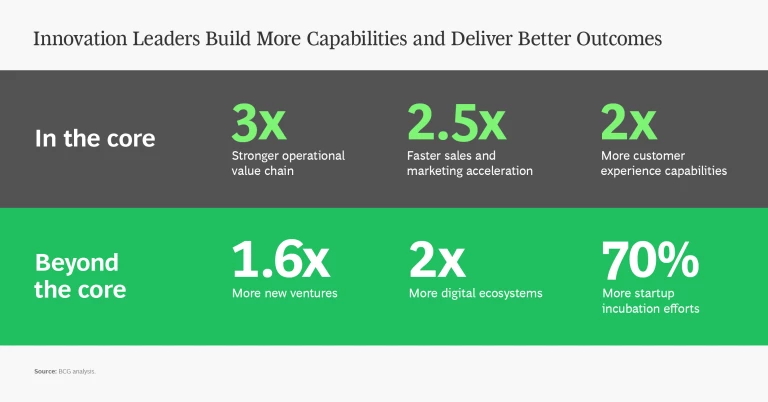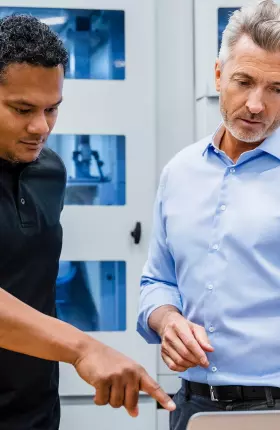The following insights are part of BCG’s Build for the Future series, based on three years of research conducted on digital transformations at major organizations around the globe.
Evolving market dynamics and technological advances are affecting companies’ short-term performance and long-term prospects. They are forcing companies to innovate—to identify high-value inventions or market opportunities and to launch new products, services, features, and experiences that capitalize on them. Leaders put exceptional effort into innovating in the core. By doing so, they create substantially more growth and value than their rivals or the cross-industry average. These companies improve near-term performance and lay the foundation for future success. (See the sidebar “Build for the Future.”)
Build for the Future
Build for the Future
Our
From this research, we identified the path that companies must take to become built for the future. We’ve reconciled the challenge of what these companies need to do (identifying which initiatives drive the most value by sector) with how to do it (determining which capabilities drive success and how to build them fast). CEOs can tailor this new playbook to their company-specific change agendas. Learn more about our Build for the Future campaign
At a Glance
Here, derived from BCG research, is what C-suite leaders need to know about deploying innovation to steer growth and create value.
The Case for Change. Over the next five years, technology-enabled companies are expected to grow close to ten times faster than those in traditional markets. Reflecting the way competition is evolving, innovation is now a top priority for close to 80% of the companies we surveyed. Despite economic headwinds, CEOs are focusing their spending on growth, balancing achieving strong short-term results with building advantages that will boost future performance. A small group is succeeding through innovation, focusing on key areas of future readiness. Close to 70% of the value that these companies create comes from revenue growth driven by innovation, a percentage significantly higher than that of their peers and the S&P Global 1200.
What It Means to Innovate. Innovation leaders differentiate their capabilities in AI and environmental, social, and governance practices. Their skill at incorporating innovation in and beyond the core separates them from other enterprises as well. They build innovation muscle within operations and the operational value chain, customer experience, and organizational culture. Beyond the core, they innovate through new products, services, and businesses. Although use cases vary, leaders realize outsize financial and nonfinancial returns and create a more comprehensive approach to innovation-led growth. Today’s top innovators commit to innovation as a strategy, gaining assets despite operating during a period of uncertainty. (See the sidebar “Most Innovative Companies 2023.”)
Most Innovative Companies 2023
Most Innovative Companies 2023
The best of innovators deliver superior short-term and long-term financial results, including better shareholder returns, as evidenced by BCG’s
Of the 50 companies included on this year’s list, 35% meet our definition of innovation leaders, including those we identify as scaling or future-built. They include such companies as Apple, Tesla, Alphabet, Microsoft, Nike, and P&G.
Drivers of Innovation Success. Innovation leaders use a number of specific enablers to inspire a level of growth that separates them from innovation laggards:
- Empowered management
- Focused teams
- Ecosystem integration
- Entrepreneurial culture
- Next-generation technology
- Innovation metrics
- Meeting employees’ intrinsic needs
- Collaboration and knowledge sharing
- Recognition of growth and expertise over tenure
- Willingness to take big bets
- A culture that values and rewards innovation
By the Numbers
A quarter of the companies that we studied are innovation leaders. These scaling or future-built companies deploy innovation in ways that improve short-term performance and long-term growth. (See the exhibit.)

Critical Elements of Innovation Success
Innovation leaders allocate resources on the basis of the outcomes they want to achieve, including for internal and external initiatives, and for short-term gains and long-term growth. To overcome barriers that could stand in the way of successful innovation, companies must focus on three critical actions:
- Strategize. Develop a clear ambition of what successful innovation looks like by linking goals to strategy; prioritize efforts in areas relevant to commercial and customer success; and take a portfolio approach to investments.
- Create and scale. Develop a portfolio of ideas that deliver business value; build and test minimum viable products to test the concepts and refine functions and market fit; and use top talent to launch, operate, and quickly scale the most successful ones into full businesses.
- Accelerate. Use technology, people, and governance to expand innovation-related capabilities and ways of working in a way that maximizes ROI.
Put Innovation into Practice
Here are some examples illustrating how leading companies are deploying innovation.
Take a multiphase approach. A leading premium beverage company used a multiphase innovation plan to rapidly accelerate growth and expand into new product categories. The company established the core capabilities it needed to build, and then it analyzed consumer trends to create ambitious growth strategies. It launched a business unit to focus on select areas of needed transformation, including sustainability, digital, and health and wellness. This centralized group led the charge on next moves, prioritizing partnerships, new ventures, and acquisitions. The approach enabled the company to scale new businesses to $1 billion in revenue and helped it emerge as an early leader in new, fast-growing consumer product categories and technologies.
Set aggressive innovation targets. A global telecommunications company set aggressive innovation growth targets to boost revenue from digital services, which had previously accounted for only 1% of the total. The company defined its digital transformation vision and priorities, designed an innovation strategy, established cross-functional teams dedicated to building products for specific customer journeys, and updated its IT architecture to support the new offerings and faster development pace. The innovation enablers set the stage for the company to successfully launch more than 15 new products, which are expected to add $250 million to the company’s annual operating income.
Use generative AI to ideate. A global consumer goods manufacturer is considering using generative AI in business development to quickly conceive of new product ideas and related promotional campaigns. In a demo, the AI tool simulated customer segmentation, generated ideas for new products in existing categories, and mapped out potential social media promotions. The tool produced focus group guides and simulated how target customer segments might answer questions to predict possible feedback.
Learn more about what it takes to use innovation to build for the future in the slideshow below.




























